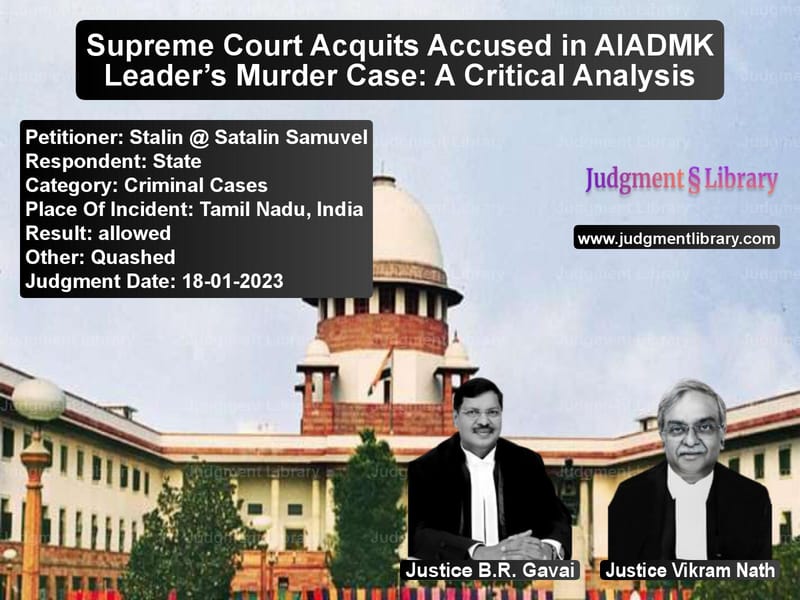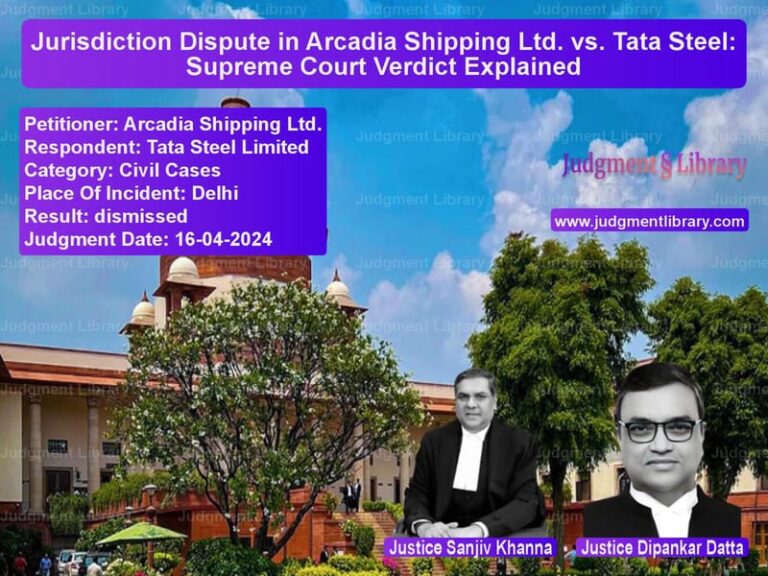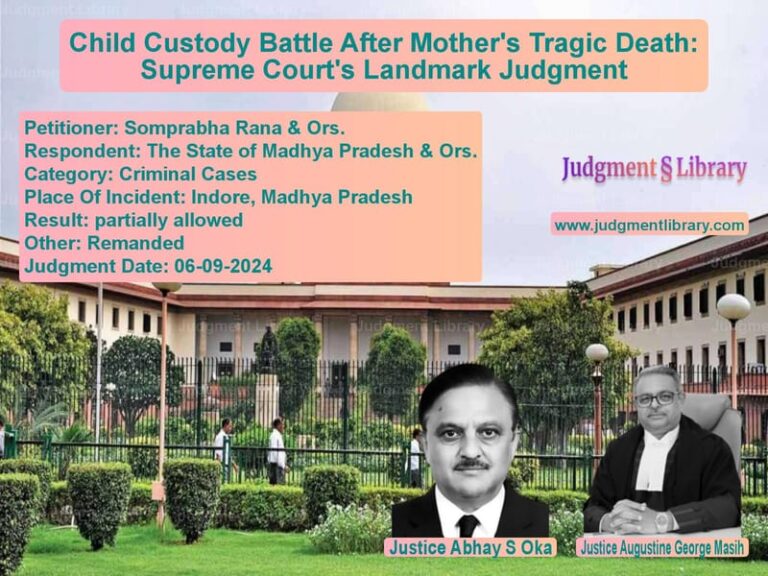Supreme Court Acquits Accused in AIADMK Leader’s Murder Case: A Critical Analysis
The case of Stalin @ Satalin Samuvel v. State involves a high-profile political murder in Tamil Nadu, where the accused were convicted for the murder of M.R. Ravi, a local AIADMK leader. The Supreme Court’s judgment in this case overturned the conviction, citing serious procedural lapses, unreliable witness testimonies, and flawed identification procedures. The judgment raises critical questions about the fairness of criminal investigations and the role of law enforcement in ensuring justice.
Background of the Case
The prosecution alleged that the murder was a result of political rivalry. The deceased, M.R. Ravi, was the Town Secretary of AIADMK in Ambattur, Tamil Nadu. According to the police, he was attacked by a group of six armed men on June 2, 2006, while he was inside his real estate office. The attackers stabbed him multiple times before fleeing.
Three prosecution witnesses, Kumar (PW-1), Palani (PW-2), and Sivalingam (PW-3), claimed to have seen the accused attack the deceased. They alleged that the assailants belonged to a rival faction within AIADMK. The prosecution also presented an alleged motive, stating that two of the accused had been arrested earlier in criminal cases and blamed the deceased for instigating their arrests.
The trial court convicted the accused under Section 302 read with Section 149 IPC and sentenced them to life imprisonment. The conviction was upheld by the Madras High Court. However, the Supreme Court found significant lapses in the investigation and trial process, ultimately acquitting the accused.
Key Legal Issues
1. Reliability of Witness Testimonies
The prosecution’s case heavily relied on the statements of PW-1, PW-2, and PW-3, who claimed to have witnessed the murder. However, their testimonies raised serious doubts:
- The witnesses admitted that they fled the scene immediately after the attack and returned only after 10 minutes.
- The police inspector, Syed Jamal (PW-23), testified that when he arrived at the scene, the eyewitnesses were not present.
- Another police officer, M. Rangarajan (PW-25), also stated that the key witnesses arrived at the hospital after learning about the incident, contradicting their claim of witnessing the attack.
The Supreme Court observed:
“There is a strong possibility that PW-1, PW-2, and PW-3 arrived at the scene after the attack had occurred. Their testimonies cannot be relied upon without corroborative evidence.”
2. Flaws in Identification Parade (TIP)
The identification of the accused was a crucial element of the prosecution’s case. However, the Test Identification Parade (TIP) was found to be highly unreliable due to the following reasons:
- The accused were shown to the witnesses in police custody before the TIP.
- Photographs and videos of the accused were taken by the police before the parade.
- The Judicial Magistrate who conducted the TIP, Malarvizhi (PW-4), admitted in cross-examination that the accused were kept in custody for eight days before the TIP, giving witnesses ample opportunity to see them beforehand.
The Court ruled:
“When the accused are shown to the witnesses before the identification parade, the TIP loses its evidentiary value. The trial court and High Court erred in relying on such tainted evidence.”
3. Political Bias and Police Misconduct
The Supreme Court also took note of potential political bias in the investigation. It was observed that:
- The prosecution failed to provide a fair and impartial investigation.
- The investigating officers manipulated evidence and pressured witnesses.
- A key prosecution witness, Thanikaivel, had told the magistrate that the police tortured him into giving a false statement.
The Court held:
“The prosecution’s conduct raises serious doubts about the fairness of the investigation. The benefit of the doubt must go to the accused.”
Final Judgment
After analyzing the evidence, the Supreme Court ruled that the prosecution failed to establish the guilt of the accused beyond reasonable doubt. The Court acquitted all the accused, stating:
“The prosecution has failed to prove its case beyond reasonable doubt, and the accused are entitled to the benefit of doubt. The conviction and sentence are set aside.”
The Court ordered the immediate release of the accused and discharged their bail bonds.
Impact of the Judgment
The judgment has significant implications for criminal jurisprudence in India:
- Ensuring Fair Investigations: The ruling highlights the importance of unbiased investigations and calls for strict action against police misconduct.
- Strengthening Witness Protection: The case underscores the need for better safeguards to prevent witness coercion.
- Reforming Identification Procedures: The judgment reinforces the requirement that accused persons must not be exposed to witnesses before a legally valid identification parade.
- Presumption of Innocence: The ruling serves as a reminder that the burden of proof always lies on the prosecution, and any doubts must be resolved in favor of the accused.
Conclusion
The Supreme Court’s judgment in Stalin @ Satalin Samuvel v. State serves as a powerful reaffirmation of the fundamental principle of criminal law—innocent until proven guilty. By critically examining witness testimonies, exposing police misconduct, and highlighting procedural irregularities, the Court ensured that justice was served. The case stands as a reminder of the judiciary’s role in safeguarding the rights of individuals against wrongful conviction.
Petitioner Name: Stalin @ Satalin Samuvel.Respondent Name: State.Judgment By: Justice B.R. Gavai, Justice Vikram Nath.Place Of Incident: Tamil Nadu, India.Judgment Date: 18-01-2023.
Don’t miss out on the full details! Download the complete judgment in PDF format below and gain valuable insights instantly!
Download Judgment: stalin-@-satalin-sam-vs-state-supreme-court-of-india-judgment-dated-18-01-2023.pdf
Directly Download Judgment: Directly download this Judgment
See all petitions in Murder Cases
See all petitions in Bail and Anticipatory Bail
See all petitions in Custodial Deaths and Police Misconduct
See all petitions in Legal Malpractice
See all petitions in Judgment by B R Gavai
See all petitions in Judgment by Vikram Nath
See all petitions in allowed
See all petitions in Quashed
See all petitions in supreme court of India judgments January 2023
See all petitions in 2023 judgments
See all posts in Criminal Cases Category
See all allowed petitions in Criminal Cases Category
See all Dismissed petitions in Criminal Cases Category
See all partially allowed petitions in Criminal Cases Category







